 |






|
 |
 |
II. Compensation - The Dialectic of an Interregnum
 The
mobile information society is fulfilling a new global reality, initiating
a new phase of social change, and intensifying the extent of international
interdependence. The cement of the old order no long binds societal powers.
The vertical lines of the East-West conflict that were so influential
for decades are being replaced by horizontal conflict lines within societies.
In America, Europe, and Asia-Pacific societal cohesion has been based
on a promise of prosperity and on the desire of all to live better. Globalisation
opens up new prospects for that, alongside new challenges, as international
interdependence means an increase in vulnerability to failures elsewhere
and creates interaction between societies far removed from one another
in both distance and culture. The
mobile information society is fulfilling a new global reality, initiating
a new phase of social change, and intensifying the extent of international
interdependence. The cement of the old order no long binds societal powers.
The vertical lines of the East-West conflict that were so influential
for decades are being replaced by horizontal conflict lines within societies.
In America, Europe, and Asia-Pacific societal cohesion has been based
on a promise of prosperity and on the desire of all to live better. Globalisation
opens up new prospects for that, alongside new challenges, as international
interdependence means an increase in vulnerability to failures elsewhere
and creates interaction between societies far removed from one another
in both distance and culture.
Because globalisation is so far ahead of societies recognition of its
effects, a time lap has opened up. The globally relevant problem patterns
no longer correspond to the prevailing national, regional, and international
solution structures. A paradox seems to exist - the quantity of available
information has never been as abundant as it is today and yet the idea
of human future remains vague.
 Societies
and politics have delayed reactions to rising challenges. Their structures
reflect the processing of back-dated conflicts and problems. To date,
this model has proved itself in a traditional speed of development, but
it may break down when the tempo of change increases. And that is just
the case today. Political adaptation can not follow the dynamics of economics
and technology. Societies are stepping backwards into a future in which
much will be without precedent, i.e. the size of the world population,
the density of its communication, and the measure of its economic interdependence. Societies
and politics have delayed reactions to rising challenges. Their structures
reflect the processing of back-dated conflicts and problems. To date,
this model has proved itself in a traditional speed of development, but
it may break down when the tempo of change increases. And that is just
the case today. Political adaptation can not follow the dynamics of economics
and technology. Societies are stepping backwards into a future in which
much will be without precedent, i.e. the size of the world population,
the density of its communication, and the measure of its economic interdependence.
The radicalness of this structural change is expressed by compensation,
in dialectic search for a balance between risks and uncertainties. This
radicalness is typical for an interregnum and for society's uncertainty
about future paradigms. An interregnum is a stage of transition where
differing, sometimes opposing, models compete. It is becoming obvious
that globalisation and technological change will provoke a conflict of
feelings within many people. The confident trust some have in new opportunities
for individual and societal development faces the fear others have of
losing material possessions and social security.
This interregnum of contemporary society is expressed by three models
of interpretation that respond to specific characteristics of the change:
1. Globalisation leads to sharpening of cultural
zones
The creation of a transnational networked society, supported by both English
as a standard language and a spreading communication network, results
in a countermove to emphasise regional and local unity in an effort to
preserve individual identity. Citizens, social groups, or sections of
society actively evade the uncertainties of the transnational world. Such
reaction models are best articulated by the sharpening of cultural zones,
which is becoming especially obvious in the growing number of ethno-national
conflicts.
The universalism of globalisation provokes demarcation, and internationalisation
has nationalism and fragmentation as consequences. Ethnic, historical,
and national ties gain power to cause conflict.
 The
risk of international wars has diminished with the end of the East-West
conflict. At present there is no threat to security comparable to the
danger posed by the bipolar world system. In return, however, the increase
in internal or regional conflicts cannot be ignored. In Europe there are,
for example, the ethnic confrontation in Kosovo and the ethno-national
conflicts in Ireland, Spain, and France. Other examples are the minority
and nationality conflicts in Southeast Europe and the political conflict
potential in Asia, where increasing ethnical and social tension is possible.
The financial crisis has thrown parts of the population into poverty and
the political systems have proven themselves unstable. The region lacks
the democratic tradition of Europe or North America to be able to mediate
conflict with majority votes. The
risk of international wars has diminished with the end of the East-West
conflict. At present there is no threat to security comparable to the
danger posed by the bipolar world system. In return, however, the increase
in internal or regional conflicts cannot be ignored. In Europe there are,
for example, the ethnic confrontation in Kosovo and the ethno-national
conflicts in Ireland, Spain, and France. Other examples are the minority
and nationality conflicts in Southeast Europe and the political conflict
potential in Asia, where increasing ethnical and social tension is possible.
The financial crisis has thrown parts of the population into poverty and
the political systems have proven themselves unstable. The region lacks
the democratic tradition of Europe or North America to be able to mediate
conflict with majority votes.
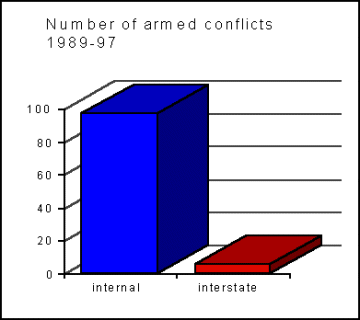
Source: Stockholm International Peace Research Institute (SIPRI)
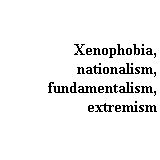 The
internationalisation of politics and economics is increasing the contact
points of different religions, world views, and ways of life. Topics of
conflict are arising between, as well as within, societies and often marginalisation,
xenophobia, and fundamentalism are the answers to political change. This
is exhibited by the attraction of Islamist movements in central Asia,
the nationalistic politics of right wings in Russia, or the extremist
endeavours of some Hindus in India. The
internationalisation of politics and economics is increasing the contact
points of different religions, world views, and ways of life. Topics of
conflict are arising between, as well as within, societies and often marginalisation,
xenophobia, and fundamentalism are the answers to political change. This
is exhibited by the attraction of Islamist movements in central Asia,
the nationalistic politics of right wings in Russia, or the extremist
endeavours of some Hindus in India.
In the industrial nation-states themselves, interdependence and immigration
can lead to xenophobia. Globalisation seems, to many, to be a zero-sum
game where the gains in other economic areas automatically imply losses
at home. The prospects of major discontinuities in individual biographies
create uncertainty and fear of the future. The search for individual identity,
anxiety about personal protection, and defence of one's own terrain can
cause the stranger to seem increasingly more threatening. Migration of
people in need calls for state resources and can rouse conflict to the
point of actual violence. The gains by movements hostile to foreigners
in Germany and France in the nineties are prominent examples of this,
as is the violence in Indonesia against well-to-do Chinese. In order to
uphold civil and peaceful order, however, it is essential that people
learn to live with this new variety, to respect differences, and to be
able to handle them open-mindedly.
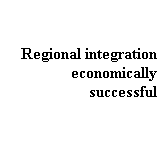 In
terms of economic regionalisation, the USA, Europe, and Asia have all,
to varying degrees, grasped the economic problems resulting from globalisation
and combined their strengths and skills. This resulted in NAFTA in North
America, Mercosur in South America, the EU in Europe, the ASEAN in South
Asia, and the APEC in Asia-Pacific. The goal of economic regionalisation
is to expand trade and stimulate the growth with liberalisation and deregulation.
Economic activity is executed within the framework of common concepts
of order and procedures, which make conflict solutions as well as regulations
possible. In
terms of economic regionalisation, the USA, Europe, and Asia have all,
to varying degrees, grasped the economic problems resulting from globalisation
and combined their strengths and skills. This resulted in NAFTA in North
America, Mercosur in South America, the EU in Europe, the ASEAN in South
Asia, and the APEC in Asia-Pacific. The goal of economic regionalisation
is to expand trade and stimulate the growth with liberalisation and deregulation.
Economic activity is executed within the framework of common concepts
of order and procedures, which make conflict solutions as well as regulations
possible.
2. The decline of traditional belief systems provokes
a search for new orientations
 The
extent and speed of the economic, technological and societal change is
already overtaxing many people. Excessive demands of change are strengthened
by a loss of collective identities in modern day society. Collective identity
deficits are the result of a world that has become non-transparent, and
in which no institution has a monopoly on making sense of the world. Traditional
large institutions, such as parties, churches or associations, and their
accompanying political programmes, ideologies, or religions have lost
their binding power. Europe is going through a phase of so-called 'dechurching'
like no other region in the world. Secularisation has led to an idea of
society that renounces religion's traditional interpretation. Religious
and similar impulses are migrating out of traditional institutions, and
new religious as well as non-religious groups are laying claim to recognition
in the public arena. This shifting of the search for meaning becomes most
apparent when one looks at large enterprises. They are becoming ever more
the point of orientation whose meaning for many employees clearly exceeds
its primary interest of the optimisation of operations. The
extent and speed of the economic, technological and societal change is
already overtaxing many people. Excessive demands of change are strengthened
by a loss of collective identities in modern day society. Collective identity
deficits are the result of a world that has become non-transparent, and
in which no institution has a monopoly on making sense of the world. Traditional
large institutions, such as parties, churches or associations, and their
accompanying political programmes, ideologies, or religions have lost
their binding power. Europe is going through a phase of so-called 'dechurching'
like no other region in the world. Secularisation has led to an idea of
society that renounces religion's traditional interpretation. Religious
and similar impulses are migrating out of traditional institutions, and
new religious as well as non-religious groups are laying claim to recognition
in the public arena. This shifting of the search for meaning becomes most
apparent when one looks at large enterprises. They are becoming ever more
the point of orientation whose meaning for many employees clearly exceeds
its primary interest of the optimisation of operations.
Traditional ways and means become less attractive
 Individualisation,
as well as new common sources of meaning, compensate for deficiencies
that have grown over long periods of time. Modern society thereby produces
a dialectic simultaneity of contrasts. Within just a few generations,
individualism has dissolved deeply rooted customs and traditions. Rituals
have been crushed and central institutions weakened. Whereas sturdy social
foundations once defined social cohesion, today individual life plans
dominate. Individualisation,
as well as new common sources of meaning, compensate for deficiencies
that have grown over long periods of time. Modern society thereby produces
a dialectic simultaneity of contrasts. Within just a few generations,
individualism has dissolved deeply rooted customs and traditions. Rituals
have been crushed and central institutions weakened. Whereas sturdy social
foundations once defined social cohesion, today individual life plans
dominate.
The increase in individual freedom is further connected to immense personal
responsibility. The individual now must permanently organise and care
for his own social integration. Because economic prosperity is the basis
of individualising societies, one can expect such tendencies to increase
in south-east Asia, provided growth processes continue and individualisation
tendencies are not suppressed by a strong cultural or political opposition
movement.
At the same time, however, there is much to be said for the fact that
individualistic tendencies are meeting their boundaries in the western
world. The plea of the communitarians in the USA indicates plural society's
weakening meaning, as does the European boom in new providers of meaning,
from sects to alternative social movements. They reduce the constant pressure
of self-integration and physical self-assertion by conveying identity
and offering collective cover.
Interest in alternative religion is growing. In 1997 new religions and
sects world-wide registered 138 million members.
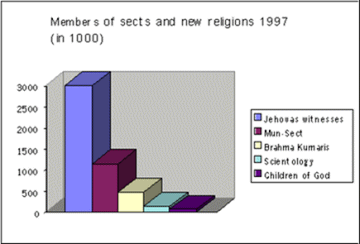
Source: Wiebus, Hans- Otto: Religionen, Sekten, Seelenfänger. Bindlach:
Loewe Verlag GmbH, 1997.
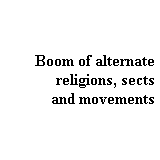 For
example, in 1935 in Japan the group Soka Gakki split off from Buddhism
and by the mid-nineties could count on 20 million members. Their ascent
indicates an intercultural trend, i.e. individualisation alone is not
producing a fulfilling social life. Pluralisation and changing values
demand understanding through societal norms which are independent of sectarian
convictions. For
example, in 1935 in Japan the group Soka Gakki split off from Buddhism
and by the mid-nineties could count on 20 million members. Their ascent
indicates an intercultural trend, i.e. individualisation alone is not
producing a fulfilling social life. Pluralisation and changing values
demand understanding through societal norms which are independent of sectarian
convictions.
3. The erosion of nation-states' problem solving
abilities leads to the development of transnationally operating non-governmental
actors
A key experience of modern society is the increasing irrelevance of political,
economic, societal, and cultural borders. They are being confronted with
a growing number of international networks. International organisations
and transnational, non-governmental actors are influencing political events
more and more. They intervene in the internal affairs of nations where
problems overtax conventional state action. Globalisation is resulting
in nation-states no longer being able to effectively fulfil their traditional
responsibilities without new forms of co-operation and communication.
Politic and economic interdependence are changing nation-states' autonomous
scope for action. The territorially bounded democracy loses its substance
while transnational politics gain in impact power - mostly without democratic
legitimation.
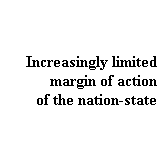 Globally
acting firms as well as non-state organisations relieve the welfare state
by patronage and commitment to the community. Firms are also becoming
centres of competence in the change process. By taking over social responsibility
they are likewise defining political positions and influencing the topics
of international politics to an increasing degree. Globally
acting firms as well as non-state organisations relieve the welfare state
by patronage and commitment to the community. Firms are also becoming
centres of competence in the change process. By taking over social responsibility
they are likewise defining political positions and influencing the topics
of international politics to an increasing degree.
Transnational enterprises are becoming weighty actors in international
politics and their resources are often considerable. General Motor's turnover
of $125 billion US in 1995 exceeded the gross national product of a medium
sized economy like Norways. In 1968 7,276 companies were operating globally
compared to 35,000 in 1990. By the end of the century this will reach
45,000. With their 280,000 subsidiaries abroad multinational firms produce
one third of the world's products. More and more they control international
investment and financial streams. Their foreign investments have increased
greatly in the recent past and in doing so raised the importance of such
companies for national economies. (A growing part of world trade is not
properly foreign trade because it is investment and delivery of goods
and services within transnational enterprises. The volume of these global
transactions is estimated to be approximately US $200 billion daily.)
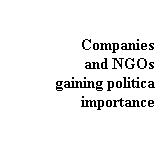 The
number of international non-governmental organisations (NGOs) rose from
1,899 in 1968 to 4,646 in 1990. By the end of this century it will double
once more. Their influence is growing: the world-spanning activities of
the Pugwash conferences, the environmental protection organisation Greenpeace,
or the human rights organisation Amnesty International are all examples
of this. The raw material for this work is information, which is the instrument
of effective communication. The transnational society is creating the
platform for more expansion by further optimising digitised data flow.
Even smaller organisations will be able to perform internationally co-ordinated
and effective actions. The
number of international non-governmental organisations (NGOs) rose from
1,899 in 1968 to 4,646 in 1990. By the end of this century it will double
once more. Their influence is growing: the world-spanning activities of
the Pugwash conferences, the environmental protection organisation Greenpeace,
or the human rights organisation Amnesty International are all examples
of this. The raw material for this work is information, which is the instrument
of effective communication. The transnational society is creating the
platform for more expansion by further optimising digitised data flow.
Even smaller organisations will be able to perform internationally co-ordinated
and effective actions.
Globalisation and the fields of compensation sketched above are being
driven by accelerating cycles of innovation. Both processes - opening
and renewal - are interrelated. The development of new technologies opens
up new fields of growth and reduces the transaction costs of acting across
national borders. On the other hand, globalisation stimulates competition
and thereby increases pressure to innovate. These international developments
bear a certain resemblance to the situation at the beginning of the twentieth
century, as internationalisation andtechnological progress brought about
an unsurpassed level of simultaneous competition and interdependence.
At the end of the century, the process is repeating itself but with greater
speed and density than ever before.
Contents
Chapter 1
Chapter 2
Chapter 3
Chapter 4
TOP
|
 |